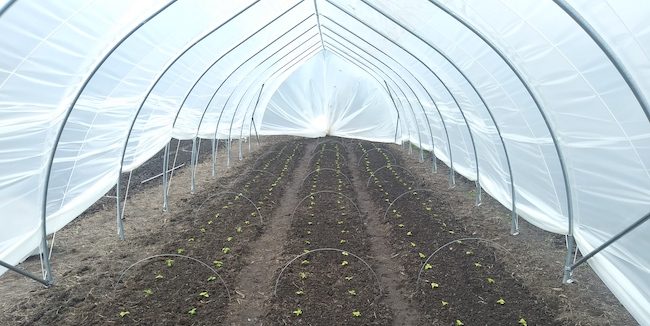
In 2020 The FruitGuys Community Fund was able to support 15 small farms and agricultural nonprofits with a total of $51,098.87 in grant funding. While it was an incredibly challenging year for folks across the world. Despite the pandemic, our 2020 grantees were able to complete sustainability projects bettering their farms and their communities. We couldn’t be prouder to share their final progress reports with you.
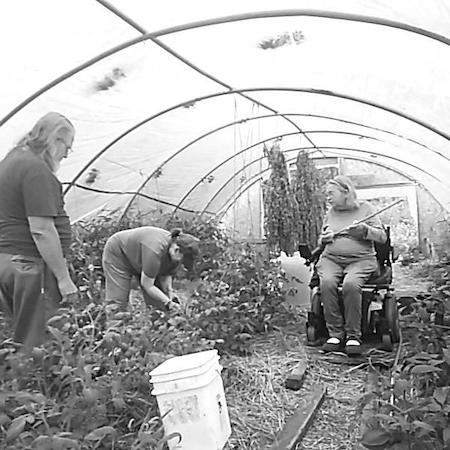 Bittersweet Farm
Bittersweet Farm
Bittersweet Farm is a 80-acre farm in Heuvelton, NY, that grows perennial plants, cut flowers, vegetables, herbs, tree fruits, berries, and nuts. They also raise Scotch Highland cattle, St. Croix sheep, Tamworth hogs, and heritage chickens. Last year, they started their Weekend Workshare Program, through which community members can work with the farm to earn the equivalent of $15 per hour in food. Their program goal is to teach farming skills and increase local food access for low-income families.
They received a $2,775 grant to expand this program by extending their growing area to include berries, vegetables, herbs, and flowers, and to purchase tools, boots, and gloves for Workshare members to use. The Bittersweet Workshare program has been a huge success! The program served 22 adults and 9 children, as well as 10 additional extended family members who were able to connect with Bittersweet as a result of their relatives’ participation. Farm owner Ann Bennet told us that revenue increased by 5% and that the program had a significant community impact. She said, “new friendships and connections were quickly formed – not just between Bittersweet Farm and Workshare members, but between participants and other like-minded community members.”
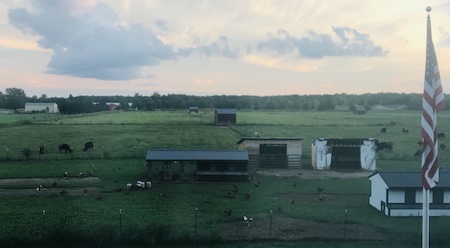 Blue Yonder Organic Farm
Blue Yonder Organic Farm
Blue Yonder Organic Farm is a 20-acre farm in North Salem, IN, that produces organic, pastured meats, eggs, shiitake mushrooms, honey, maple syrup, vegetables, berries, apples, and Asian pears that are sold through farmers markets and their online store.
They received a $4,040 grant to purchase wildflower and herb seeds, birdhouses, and protective fencing. They have used these supplies to create wildlife hedgerows of trees, shrubs, and wildflowers around their pastures. Owner Sara Creech said, “I am so excited to continue seeing this previous corn/soybean acreage become a training location for what an integrated pasture that focuses on grass production and biodiversity, looks like.” Despite the pandemic, they shared their project with local master gardeners and through a couple of virtual education programs.
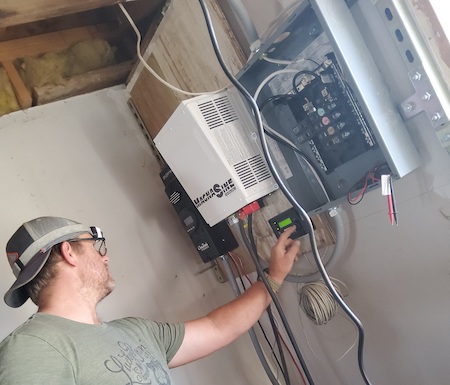 Coffee Pot Farms
Coffee Pot Farms
Coffee Pot Farms is a 1-acre farm located in the Navajo Nation in Winslow, AZ, that grows greens, tomatoes, peppers, other vegetables, and seedlings.
They received a $5,000 grant to install a solar power system and renovate a building into a post-harvest cold-storage room. Owner Cherilyn Yazzie told us, “The project is 100% complete and it generates power to run our walk-in cooler, salad spinner, greens bubbler, LED lights, internet modem, and a water pump.” Installing a solar system has helped Coffee Pot Farms reduce food waste and increase productivity and profitability. They were even able to provide electricity for a small apartment they’ve renovated, which will serve as intern housing.
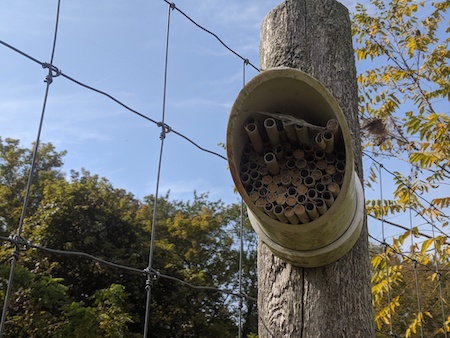 Comeback Orchards
Comeback Orchards
Comeback Orchards is a 10-acre farm in Asbury, NJ, that grows organic fruit, including apples, pears, Asian pears, plums, apricots, cherries, peaches, and nectarines, as well as organic vegetables, which they sell primarily at farmers markets.
They received a $3,116 grant to diversify their orchard and support pollinators by adding 350 highbush blueberry plants, 25 mason bee houses, and wildflower plantings . It has been a big year for Comeback Orchards. Owner Peter Tischler informed us that, “after seven years of farming on my friend’s farm, we’ve decided to end our partnership.” Thankfully, he will be able to move his project to a new farm. He told us, “I’m in the process of digging up the trees and berry plants and moving the orchard 30 miles north.” Despite this change of plans, he harvested mason bee cocoons to overwinter and release on the new farm. He also sowed wildflower plantings at the new farm.
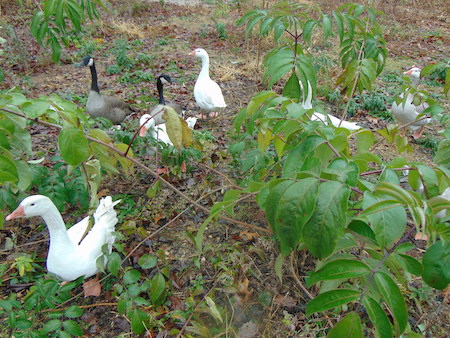 Dry Creek Farm
Dry Creek Farm
Dry Creek Farm is a 1-acre farm in Tahlequah, OK, that sells certified organic produce at their local farmers market and through a farm-to-school program.
They received a $2,012 grant to convert hog pasture into an orchard and vineyard. Dry Creek overcame challenges with late shipments, weather, pests, and the pandemic to complete their project. Their berry patch has done well. Project Manager Ron Cook told us that, “no soil was lost due to erosion, and the green spaces developed between rows of berry bushes provided summer forage for our flock of endangered Cotton Patch Geese.” They were also able to allow an Indigenous Studies group from Northeastern State University to utilize the berry patch for socially-distant lab days.
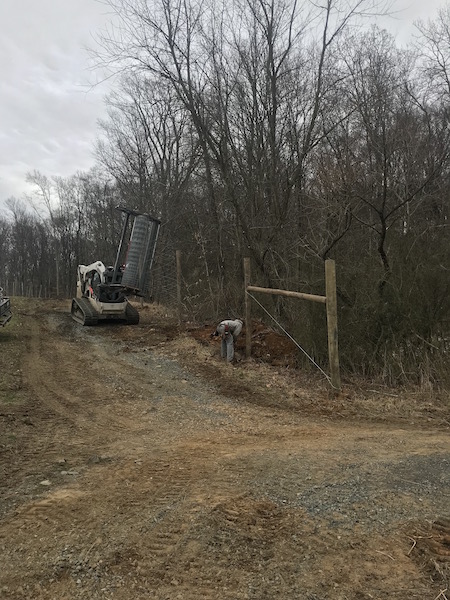 Frecon Farms
Frecon Farms
Frecon Fruit Farms Inc. is a 75-acre farm in Boyertown, PA, that produces a wide variety of fruit. They sell to farmers markets, small retailers, local schools, hospitals, food banks, and The FruitGuys.
They received a $1,991 grant to help complete a deer fencing project that will help reduce damage to their orchards from the growing population of white-tailed deer in their area. They completed their project in early March. Owner Steve Frecon told us, “the fence has been 100% successful in keeping deer out of the orchard. We have no presence of deer in the orchard, no fecal matter from deer, and our trees are growing much healthier without the deer eating them.”
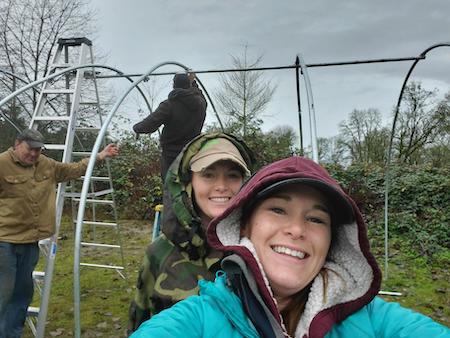 Hollyaire Farm
Hollyaire Farm
Hollyaire Farm is a 40-acre farm in Junction City, OR, that produces a wide variety of fruits, vegetables, herbs, and eggs, which they sell at their farmstand, as well as wholesale to other local farms and businesses.
They received a $3,650 grant to purchase two high tunnels to increase their production, add 50 fruit trees to their orchard, and install bee, bat, and owl boxes. Despite some pandemic related setbacks, Hollyaire was able to install their new equipment. Co-owner Heather Paterson also told us, “[we] employed workers who had lost their jobs during this pandemic [and were] able to produce food for nonprofit organizations.”
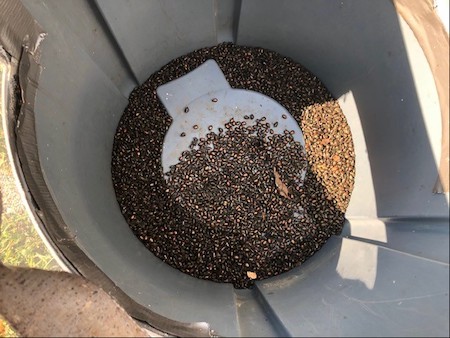 Kansas City Community Gardens (The Giving Grove)
Kansas City Community Gardens (The Giving Grove)
The Giving Grove is an agricultural nonprofit in Kansas City, MO, in conjunction with Kansas City Community Gardens. It establishes and supports orchards in low-income neighborhoods by partnering with local nonprofits, communities of faith, and health agencies. Fruit from 176 orchards is made freely available to the local community or donated to food pantries.
They received a $3,015 grant to build and install Japanese beetle traps, designed by the University of Missouri, to protect their orchards from this destructive pest. This spring, The Giving Grove created a virtual tutorial that allowed volunteers to build and set up the traps at different sites. Volunteers reported that the traps were successful, and there was less damage to trees throughout the season. Grant writer Ryan J. Davis told us that, “the long-term positive impacts of our work installing Japanese beetle traps in our orchards cannot be understated. Ultimately, less beetles equates to a healthier year of tree and bush growth, resulting in higher fruit, berry and nut production and greater yields for community members over the lifetime of the plants.”
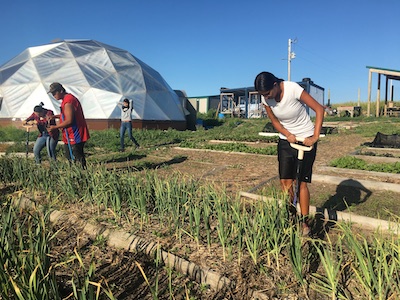 Sicangu Community Development (Keya Wakpala Gardens)
Sicangu Community Development (Keya Wakpala Gardens)
Keya Wakpala Gardens is a 1-acre agricultural nonprofit organization in Mission, SD, that produces a wide range of vegetables, as well as eggs and honey. Their products are distributed at local farmers markets and across the Rosebud Indian Reservation, thanks to their mobile market units. Excess produce is donated to different programs on the reservation, such as the Commodity Supplemental Food program, the Tree of Life Ministry, and the Adult Corrections Facility. Their goal is to teach interns and community members how to become producers.
They received a $2,519 grant to purchase fruit trees, shrubs, a chipper/shredder, cover crop seeds, and a tilther tool. Despite pandemic restrictions and some staff changes Keya Wakpala Gardens was able to purchase and use their tilther and cover crop seeds to expand their growing area using no-till practices. They were also able to secure additional funding to purchase a more expensive chipper/shredder after a shortage of their first choice. Due to the pandemic, they also missed the window for planting new fruit trees but Food Sovereignty Director Matthew Wilson told us, “we were able to work with a consultant from a South Dakota university to help us plan out our orchard.” They now plan to plant their orchard in the spring of 2021.
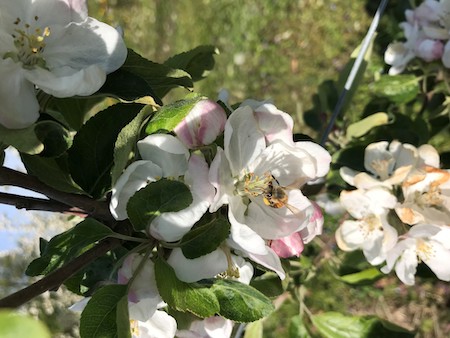 Mick Klug Farm
Mick Klug Farm
Mick Klug Farm is a 120-acre farm in St. Joseph, MI, that grows and provides more than 30 varieties of fruit and vegetable crops to Chicago-area markets, restaurants, breweries, and small grocery stores.
They received a $4,865 grant to establish hedgerows of native plants throughout the property. After discussion with local experts, Mick Klug opted to plant patches of clover for bee habitat and rent honeybee hives. Owner Abby Schilling told us that, “berry yields were of exceptional quality proximate to clover plantings, indicating highly successful pollination for these crops [and there was] noticeable prevention of soil erosion and wind damage.”
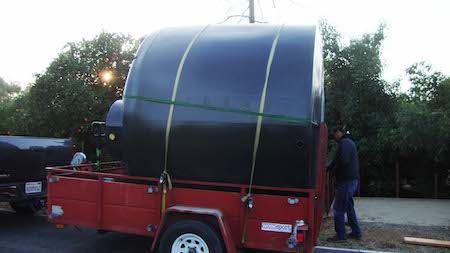 Rancho Charanda
Rancho Charanda
Rancho Charanda is a 3-acre farm in Redlands, CA, that grows oranges, tangerines, lemons, avocados, sugarcane, chile peppers, and a wide variety of native California foods, such as cactus paddles, prickly pear, xoconostle, and cholla.
They received a $3,198 grant to purchase a water storage tank and replace their outdated drip irrigation system. Despite running into some pandemic-related supply issues, Rancho Charanda was able to complete their new irrigation system. Owner Paul Rodriguez said that the new irrigation tank will allow them to have access to water even in the triple-digit weather that has become common in summer months.
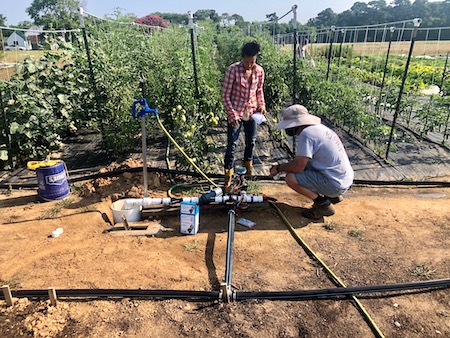 Seafield Farm
Seafield Farm
Seafield Farm is a 1-acre farm in Cape Charles, VA, that grows a wide variety of vegetables, herbs, flowers, and pecans, as well as producing eggs and honey.
They received a $2,090 grant to install drip irrigation and two hydrant water spigots on their farm. Seafield successfully set up their new irrigation system, and it has already helped reduce labor and increase production. They were also able to teach another farm how to do the same. Owner Jenna Rodriguez also told us, “… our production has been high, possibly from [the] better watering system, allowing us to donate to our local food bank.”
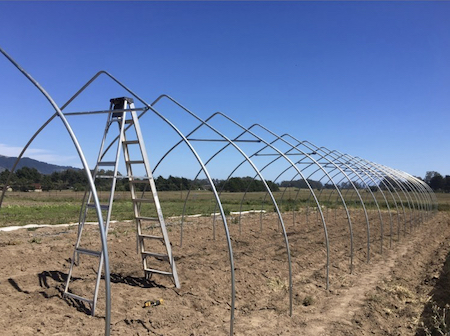 Shao Shan Farm
Shao Shan Farm
Shao Shan Farm is a 5-acre farm in Bolinas, CA, that grows organic Asian heritage vegetables, which are sold to chefs, farmers markets, grocery stores, and regional communities. They also donate produce to local food pantries, senior dinner programs, and bi-weekly gleanings.
They received a $4,881 grant to purchase a rotary mower and hoop house. Shao Shan was able to purchase both the mower and the hoop house and put them to good use immediately. They’ve been using the mower to manage their cover crops and the hoop house to grow cucumbers and bitter melons. Farmer Scott Chang-Fleeman told us, “the tunnel and the mower helped us to provide for our expanded market this year, reaching 62 CSA members, two farmers markets, restaurants, and grocery stores.”
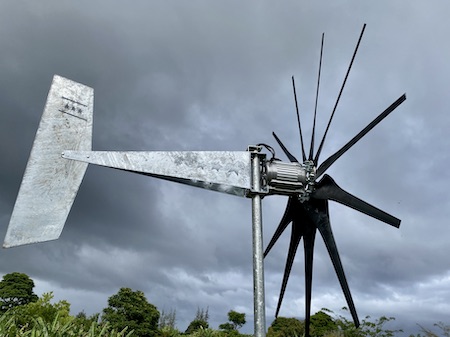 Sugar Hill Farmstead
Sugar Hill Farmstead
Sugar Hill Farmstead is a 10-acre farm in Hilo, HI, that produces pastured meats and eggs, raw honey, and organic bananas. Their livestock supplies the only meat CSA available on the Big Island. The bananas are sold to a local smoothie shop or dehydrated and sold at another farm store.
They received a $4,351 grant to purchase two windmills and expand their solar-power system, decreasing their reliance on generators and further reducing their fossil fuel consumption. After some research they opted to purchase one larger turbine. Co-owner Brittany Anderson told us that the project was a success. She said, “The wind turbine is generating ample energy. We have not had to use the generator since the installation.”
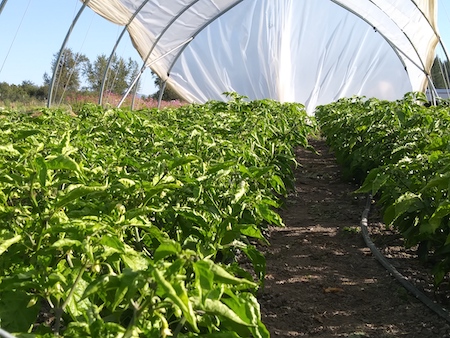 Thompson Creek Farm
Thompson Creek Farm
Thompson Creek Farm is a 2-acre farm in Newman Lake, WA, that grows a wide variety of vegetables, berries, and fruit, which they sell through a CSA and to local farmers markets and restaurants.
They received a $3,592 grant to purchase owl and bat boxes and a hoop house. Thompson Creek has had great success with their projects. They saw a noticeable decrease in rodent pressure due to their owl boxes and high yields of tomato and lettuce crops grown in their new hoop house. They were also able to use some of the funding to purchase and build seed saving supplies. Owner Becca Woollett said the seed saving supplies “probably cut our work time in half at the end of the season while cleaning seeds.”
We never cease to be impressed by our grantees’ hard work, especially in this extraordinary year. The class of 2020 was able to implement natural pest management, switch to renewable energy, save seeds, make local food more available, and more. If you’re able, we’d appreciate your support in continuing our grant program. Please donate to support small farm sustainability!
Jordan Charbonneau is an organic farmer and writer from West Virginia. She holds degrees in ecology and environmental humanities from Sterling College in Vermont.



